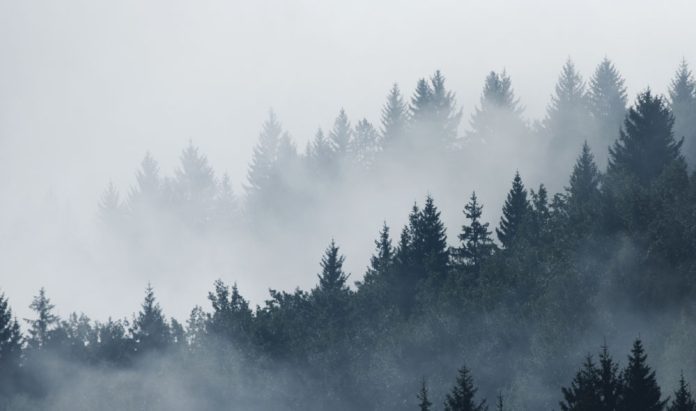By Mike Spry
It began with two fires: one a tragedy, and one an awakening. The first took everything, a life-changing inferno in Christopher Stock’s grandmother’s house that left his family and his community with just embers, pain and memories. And as fire took everything from him, Stock looked to fire for his next steps in life.
Christopher Stock is a story unto himself, a fifth-generation member of Wahta Mohawk Territory near Bala, Ontario, whose ancestors relocated to Muskoka from Kanehsatake, Quebec in 1881. But here in 2022, at the height of settlers’ reckoning with reconciliation, Stock has begun a journey of education to bring the language and lore of his people into communities, both digital and analog.
“I base everything off of the original instruction given to us by the creator, which is the Thanksgiving address, ohén:ton karihwatéhkwen, which means, ‘all the words that come before anything else.’ And what it says is that we gather our minds together as one, and in doing so we put all our attention towards all of creation and give thanks to the creator, but not just thank you. It’s more that we offer greetings of love, honour, respect, thanks, and gratitude to the creator for all that he’s given us. Because he gifted us everything we needed to sustain our lives on this earth. We didn’t ask for it. We didn’t demand it. He gave it openly and freely and he made sure that everything was in its place.”



“After the fire, I was so stricken with grief, I felt lost and didn’t know what I was going to do next. One October morning, I decided to go for a walk in the woods. Not really knowing where I was headed, but the area I was walking was familiar to me. As I continued into the woods, I found a comfortable spot and I built a fire,” he says with a storyteller’s tenor. “I sat there all day, from sunup to sundown, sometimes even beyond sundown and just sat in the woods, just be there in the moment and listened. I did that for the whole winter, in all types of weather, watching the fire, listening to the wind and observing all of the life around me. Then came springtime [and I] let the fire out [and] my life started to change.”
Opportunities began to present themselves: A chance to go back to school to pursue a teaching career, an adult full immersion Mohawk language course, and a teaching position as a Mohawk language teacher on the Six Nations of the Grand River Territory in Ontario. Teaching and promoting awareness and understanding of Indigenous culture, history, and language would become his calling – found in the dreamscape of fire.
Eventually, he found his way back to Muskoka and relocated his family in Bracebridge, Ontario, in 2009, continuing his work throughout the Muskoka region: Trillium Lakelands District School Board, and Wahta Mohawks. He was realizing the vision of his purpose and doing invaluable work in bringing the history, culture, and language of his people to the surrounding communities.
Then came a fire of a different kind: cancer.
“So it was 2018. July 28th; it was a Friday, I was working in a quarry, cleaning up at the end of the day’s shift, and something felt really odd. I had this stabbing pain in the right side in the middle of my back. I blew it off, thinking I probably just overdid it. I waited it out through the whole weekend and my daughter’s 16th birthday – I didn’t want to ruin her day and make her worry, so I suffered through it,” before he finally went to the hospital.
“Turns out that’s when they found out that I had aggressive Stage Four cancer. They said my whole abdomen was a tumour. It was constricting where my stomach and small intestine were joined. I had lesions on my liver and it was in my bone marrow.” Still, he says, “They were confident that they could knock it all out with six aggressive rounds of chemotherapy.”
His journey forked but did not fall – to spend an hour talking to Christopher Stock is to know he is a survivor. “My daughter swears that I was gone two different times.” The cancer, for the moment, is dormant – a fire that is but ember and dust, yet he and it live in worry of spark. “I have a 75% chance of making it to five years cancer-free.” That’s enough for Christopher Stock to continue his journey.

Embers and spark, embers and spark.
“It’s a challenge to survive; sometimes it’s hard to know and understand what that means, to be a cancer survivor. It’s hard to know and understand how to feel about that. But what is hardest of all is that people don’t know and understand either, because they think: Okay, you’re cancer-free! So you’re back to normal, right? What I do know and understand is that all of my teachings and my understanding of the Thanksgiving Address, guided me through this experience and that humour, and laughing hard, loud and long is the best medicine for the spirit.”
Stock has chosen to direct his days towards his new path. He has aspired to promote awareness and understanding of Indigenous culture, history, and language. “A Journey Begins: An Interactive Indigenous Cultural Experience” (ajourneybegins.ca) is an online portal for education, reconciliation, and cultural examination. “Cultural sensitivity is more important than ever these days. Our goal is to provide you, your employees and your business with real-time experiences, to increase your understanding of Indigenous culture, history, language and ways of knowing and being.”
“A Journey Begins” is the evolution of Stock’s pedagogy and mission. “In its early days, it was about me travelling to various schools and school boards to present them with the experience of taking part in a traditional Iroquoian social gathering,” he says. But now, he aspires to bring his message to a larger community, to experience the traditions of his people. “Our traditions are communicated through the interactive participation in the ceremonial opening address (recited in one of its original languages), to the story of our social dances and songs and the connections to the natural world, followed by a demonstration of these social dances and songs with volunteers.”
So what role does Stock play in reconciliation, and what role do we – as community members, as settlers, as allies – play within the context of Stock’s initiatives? “My understanding [is] the responsibility of carrying such knowledge. The role that I play is that of a teacher, to pass down my knowledge to our successive generations, so that they may remember and pass it onto the next.” Stock is a living, breathing historical document we can help by engaging in Indigenous traditions and history as facilitated by his guidance and teachings.
There is no issue in Canada more important, fractious, and inflamed right now than Indigenous representation and reconciliation. Stock is on the frontlines of that discourse. Back into the fire he goes, and he’s asking that this time, we join him.



